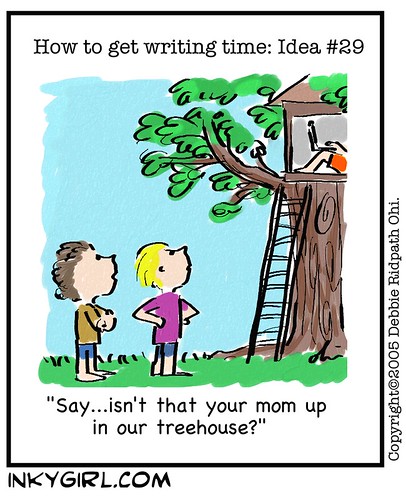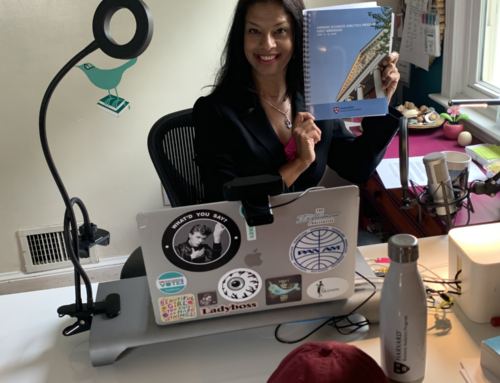My foray into the U.S. public relations world dates back to 2000, when I had just moved to this country. Apparently “networking” was the way to go (in India we called it the “old boys’ club”) and, dutifully following the lead of more experienced professionals, I plunged myself into monthly meetings of the San Francisco Bay Area Publicity Club (which we fondly called “The Pub Club”).
Of all the characters – some offbeat, some extremely colorful – that I met, no one left a more lasting impression on me than “Mr. T.” I can’t remember his full name, but I do recall that his first name began with a “t,” was older than the average Pub Clubber (20-something), had worked primarily in Tech PR, and had recently been laid off (we’re talking late 2000/early 2001 here).
Mr. T said to me, “I can’t write, but I don’t think that’s important. I know how to do PR, and there are enough writers to go around.” (Or words to that effect.)
I remember being quite taken aback by that pronouncement. However, being a (fairly) well-brought up Bengali girl, I smiled politely and moved on to exchange pleasantries with the less-outré attendees at the event. But Mr. T’s words stayed with me. Every now and again, I wondered if he was right.
I don’t think so.
If you’re a journalist, author or successful blogger, you already know why.
PR professionals – especially those who are new to the industry – if you ever had doubts about the importance of being able to write well, consider:
Your communications with clients, the media and internal constituents invariably comprise a high volume of writing. How will you convince them of the validity of your plans, pitches or whatnot if you can’t express yourself well in the written medium?
We live in an age where short attention spans are not just the norm, they’re “ADOS,” as Peter Shankman famously describes himself. Lose your audience before your first paragraph is complete, and you risk the possibility of losing their attention for good.
We are trying to survive through a time of record job losses and the fear and self-questioning that accompany them. If ever there was a time to showcase the diversity of your talents, it is now.
Getting Started on Writing Well
Being able to write beautifully may be a gift, but being able to write well – both succinctly as well as with meaning – can be learned. Here are just a few ways:
Give yourself a précis exercise. One of the most useful high school English classes I had to go through was “précis,” or the practice of distilling several, often long-winded, paragraphs, into a finite number of words without losing the essence of the original writing. Try it: create a table in Microsoft Excel of “x” number of cells, and allow yourself no more than one word in each cell (punctuation marks can be included after a word). How good are your compression skills?
If you haven’t already jumped on the bandwagon, get thee on Twitter. What better exercise in expressing yourself succinctly than in being restricted to 140 characters?
Capture your soundbites. While this word may have been bequeathed to us by audio-visual media, there is nothing more potent than a catchy phrase that rolls off the tongue, that not only captures the essence of what you’re trying to say, but can be used across many mediums, be they press releases, op-eds, or messaging documents.
You may be well ahead of me and, if so, please do share your tips. If you’re still trying to figure out the skills you need to hone as a public relations professional, though, don’t dismiss the ability to write well.
It might make the difference between being – well, Mr. T and you.
Image courtesy Debbie Ridpath Ohi.



![[EVENT]: PR Hacks for Small Biz (online)](https://shonaliburke.com/wp-content/uploads/2021/06/FB-Ad-1200x800-01-01-01-Copy-500x383.jpeg)






Read it. Enjoyed it. Proud of you!
Thank you, all for these great thoughts.
Tom, it is particularly interesting to me how Gen Y approaches writing, and I think (hope) we have some great future leaders in PR out there.
Aditi, yes, reading is a great way to hone one’s style. Kudos.
Gail, thanks so much, happy client comments are wonderful to receive!
Great post. As a PR pro who worked for almost 10 years as a journalist first, writing is extremely underrated in this profession.
If you’re pitching media, you need to give the reporter or editor something that LOOKS like a story (including additional sources, stats, perhaps a photo element), but if the writing does not communicate the ultimate story idea very well, then you have very little chance of placement for your hours of work.
I do hope Gen Y workers don’t forget the importance of writing. In this digital age, they are very proficient on-line and in researching just about anything, but I do worry that the quality of writing will suffer.
Hi Shonali,
Many a times my friends ( who somehow think my job is cool) ask what it takes to be a PR professional, the only thing I point out is the need to be able to write well, everything else is easily mastered, its no rocket science to be able to keep in touch, to respond to mails in a timely manner, to pick up the phone and inform, to coordinate visit media visits as & when required etc etc, of course it is no rocket science to write well either, but that needs practice. I found reading the newspaper and serious fiction very useful while developing mine, to whatever level I am now. Some PR people, not in agencies but corporates do not write well, they are overtly dependant on agencies, who honestly do a fabulous job of dissemination but sometimes due to limited exposure to products/subjects are unable to capture the full essence of what needs to be described.
I must however say, I think a writer (not a PR manager) also has a different eye, her interpretations of mundane, day to day or even exotic stimulus is different from everyone else’s, it is that slightly variant opinion, expressed in eloquent/unique language creates the magic of a great novel.
Writing is the most important, if not the only pre-requisite of becoming a good PR professional.
Shonali, well said! Those who can teach, also do :-)
Alan, thanks very much for the tip.
Lisa, thanks to you too! I think – and hope – people are coming to realize the importance of being able to write not only well, but adapting their writing to different mediums and needs. I wonder how Mr. T’s doing?
I can’t imagine being in any communications role and dismissing the importance of good writing skills. A top-notch PR needs to be clear and persuasive, often via written pitches and proposals. This post is a must-read for new PRs – and all those Mr. Ts out there!
I recommend, available on a pleasant compact disc, “On Writing Well,” by William K. Zinsser.
Isn’t that the truth, Steve? Thank you!
Absolutely 100% true, and nicely written too … which is a good thing, because this kind of post could open you up to criticism from smart alecs :)